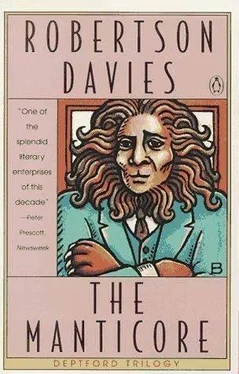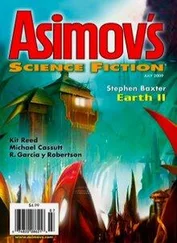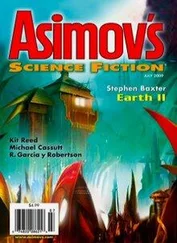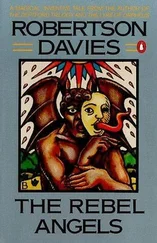Robertson Davies - The Manticore
Здесь есть возможность читать онлайн «Robertson Davies - The Manticore» весь текст электронной книги совершенно бесплатно (целиком полную версию без сокращений). В некоторых случаях можно слушать аудио, скачать через торрент в формате fb2 и присутствует краткое содержание. Жанр: Триллер, на английском языке. Описание произведения, (предисловие) а так же отзывы посетителей доступны на портале библиотеки ЛибКат.
- Название:The Manticore
- Автор:
- Жанр:
- Год:неизвестен
- ISBN:нет данных
- Рейтинг книги:3 / 5. Голосов: 1
-
Избранное:Добавить в избранное
- Отзывы:
-
Ваша оценка:
- 60
- 1
- 2
- 3
- 4
- 5
The Manticore: краткое содержание, описание и аннотация
Предлагаем к чтению аннотацию, описание, краткое содержание или предисловие (зависит от того, что написал сам автор книги «The Manticore»). Если вы не нашли необходимую информацию о книге — напишите в комментариях, мы постараемся отыскать её.
The Manticore — читать онлайн бесплатно полную книгу (весь текст) целиком
Ниже представлен текст книги, разбитый по страницам. Система сохранения места последней прочитанной страницы, позволяет с удобством читать онлайн бесплатно книгу «The Manticore», без необходимости каждый раз заново искать на чём Вы остановились. Поставьте закладку, и сможете в любой момент перейти на страницу, на которой закончили чтение.
Интервал:
Закладка:
MYSELF: I don't know about "on the whole." Sensations in childhood are so intense I can't pretend to recall their duration. When I was happy I was warmly, brimmingly happy, and when I was unhappy I was in hell.
DR. VON HALLER: What is the earliest recollection you can honestly vouch for?
MYSELF: Oh, that's easy. I was standing in my grandmother's garden, in warm sunlight, looking into a deep red peony. As I recall it, I wasn't much taller than the peony. It was a moment of very great – perhaps I shouldn't say happiness, because it was really an intense absorption. The whole world, the whole of life. and I myself, became a warm, rich peony-red.
DR. VON HALLER: Have you ever tried to recapture that feeling?
MYSELF: Never.
DR. VON HALLER: Well, shall we go on with your childhood?
MYSELF: Aren't you even interested in Netty and the Domestic Internal Bath? Nothing about homosexuality yet?
DR. VON HALLER: Have you ever subsequently felt drawn toward the passive role in sodomy?
MYSELF: Good God, no!
DR. VON HALLER: We shall keep everything in mind. But we need more material. Onward, please. What other happy recollections?
Church-going. It meant dressing up, which I liked. I was an observant child, so the difference between Toronto church and Deptford church kept me happy every Sunday. My parents were Anglicans, and I knew this was a sore touch with my grandparents, who belonged to the United Church of Canada, which was a sort of amalgam of Presbyterians and Methodists, and Congregationalists, too, wherever there happened to be any. Its spirit was evangelical and my grandmother, who was the child of the late Reverend Ira Boyd, a hell-fire Methodist, was evangelical; she had family prayers every morning, and Netty and I and the hired girl all had to be there; Grandfather wasn't able to make it very often, but the general feeling was that he didn't need it because of being a doctor. She read a chapter of the Bible every day of her life. And this was the thirties, mind you, not the reign of Queen Victoria. So I was put in the way of thinking a lot about God, and wondering what God thought about me. As with the Prince of Wales, I suspected that He thought rather well of me.
As for church, I liked to compare the two rituals to which I was exposed. The Uniteds didn't think they were ritualists, but that was not how it looked to me. I acquired some virtuosity in ritual. In the Anglican church I walked in smiling, bent my right knee just the proper amount – my father's amount – before going into the pew, and then knelt on the hassock, gazing with unnaturally wide-open eyes at the Cross on the altar. In the United Church, I put on a meek face, sat forward in my pew, and leaned downward, with my hand shielding my eyes, and inhaled the queer smell of the hymn-books in the rack in front of me. In the Anglican church I nodded my head, as if to say "Quite so," or (in the slang of the day) "Hot spit!" whenever Jesus was named in a hymn. But in the United Church if Jesus turned up I sang the name very low, and in the secret voice I used when talking to my grandmother about what my bowels were doing. And of course I was aware that the United minister wore a black robe, a great contrast to Canon Woodiwiss's splendid and various vestments, and that Communion at Deptford meant that everybody got a little dose of something in his pew, and there was no walking about and traffic control by the sidesmen, as at St. Simon Zeiotes. It was a constant, delightful study, and I appreciated all its refinements. This won me a reputation outside the family as a pious child, and I think I was held up to lesser boys as an example. Imagine it – rich and pious! I suppose I bodied forth some ideal for a lot of people, as the plaster statues of the Infant Samuel at Prayer used to do in the nineteenth century.
Sunday was always a great day. Dressing up, my hobby of ritual study, and a full week to go before another assault on my uncooperative colon! But there were wonderful weekdays, too.
Sometimes my grandfather took me and Netty to what was called "the farm" but was really his huge sugar-beet plantation and the big mill at the centre of it. The country around Deptford is very flat, alluvial soil. So flat, indeed, that often Netty took me to the railway station, which she elegantly called "the deepo" just before noon, so that I could have the thrill of seeing a plume of smoke rising far down the track as the approaching train left Darnley, seven miles away. As we drove along the road Grandfather would sometimes say, "Davey, I own everything on both sides of this road for as far as you can see. Did you know that?" And I always pretended I didn't know it and was amazed, because that was what he wanted. A mile or more before we reached the mill its sweet smell was apparent, and when we drew nearer we could hear its queer noise. It was an oddly inefficient noise – a rattly, clattering noise – because the machinery used for chopping the beets and pressing them and boiling down their sweetness was all huge and powerful, rather than subtle. Grandfather would take me through the mill, and explain all the processes, and get the important man who managed the gauge on the boiler to show me how that worked and how he tested the boiling every few minutes to see that its texture was right.
Best of all was a tiny railway, like a toy, that pulled little carloads of beets from distant fields, puffing and occasionally tooting in a deeply satisfying way as it bustled along. My grandfather owned a railway! And – oh, joy beyond all telling! – he would sometimes tell the engine-driver, whose name was Elmo Pickard, to take me on one of his jaunts into the fields, riding in the little engine! Whether Grandfather wanted to give me a rest, or whether he simply thought women had no place near engines, I don't know, but he never allowed Netty to go with me, and she sat at the mill, fretting that I would get dirty, for the two hours it took to make a round trip. The little engine burned wood, and the wood was covered in a fine layer of atomized sugar syrup, like everything else near the mill, so its combustion was dirty and deliciously smelly.
Elmo and I chuffed and rattled through the fields, flat as Holland, which seemed to be filled with dwarves, for most of the workers were Belgian immigrants who worked on their knees with sawed-off hoes. Elmo scorned them and had only a vague notion where they came from. "Not a bad fella, fer an Eye-talian!" was the best he would say of the big hulking Flemings, who talked (Eimo said they "jabbered") in a language that was in itself like the fibrous crunching of chopped beets. But there were English-speaking foremen here and there on the line, and from their conversation with Eimo I learned much that would not have done for Netty's ears. When we had filled all the trucks, we hurtled back to the mill, doing ten miles an hour at the very least, and I was allowed to pull the whistle to tell the mill, and the frantic Netty, that we were approaching.
There were other expeditions. Once or twice every summer Grandmother would say, "Do you want to go see the people down by the crick today?" I knew from her tone that no great enthusiasm would be welcome. The people down by the crick were my other grandparents, my mother's people, the Cruikshanks.
The Cruikshanks were poor. That was really all that was wrong with them. Ben Cruikshank was a self-employed carpenter, a small dour Scot, whose conversation was full of references to himself as "independent" and "self-respecting" and "owing nothing to no man." I realize now that he was talking at me, justifying himself for daring to be a grandfather without any money. I think the Cruikshanks were frightened of me because I was such a glossy little article and full of politeness which had a strong edge of sauce. Netty held them cheap; mere orphan though she was herself, she carried a commission from the great Doc Staunton. Well do I remember the day when my Cruikshank grandmother, who was making jam, offered me some of the frothy barm to eat as she skimmed it from the pot. "Davey isn't let eat off an iron spoon." said Netty, and I saw tears in the inferior grandmother's eyes as she meekly found a spoon of some whiter metal (certainly not silver) for her pernickety grandson. She must have mentioned it to Ben, because later in the day he took me into his workshop and showed me his tools and all the things they could do, while talking in a strain I did not understand, and often in a kind of English I could not easily follow. I know now that he was quoting Burns.
Читать дальшеИнтервал:
Закладка:
Похожие книги на «The Manticore»
Представляем Вашему вниманию похожие книги на «The Manticore» списком для выбора. Мы отобрали схожую по названию и смыслу литературу в надежде предоставить читателям больше вариантов отыскать новые, интересные, ещё непрочитанные произведения.
Обсуждение, отзывы о книге «The Manticore» и просто собственные мнения читателей. Оставьте ваши комментарии, напишите, что Вы думаете о произведении, его смысле или главных героях. Укажите что конкретно понравилось, а что нет, и почему Вы так считаете.












